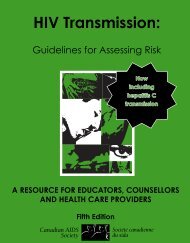A Guide to Primary Care of People with HIV/AIDS - Canadian Public ...
A Guide to Primary Care of People with HIV/AIDS - Canadian Public ...
A Guide to Primary Care of People with HIV/AIDS - Canadian Public ...
Create successful ePaper yourself
Turn your PDF publications into a flip-book with our unique Google optimized e-Paper software.
A <strong>Guide</strong> <strong>to</strong> <strong>Primary</strong> <strong>Care</strong> <strong>of</strong> <strong>People</strong> <strong>with</strong> <strong>HIV</strong>/<strong>AIDS</strong><br />
Chapter 14: Mental Health Disorders<br />
14<br />
ill, brain injured, or metabolically unstable patients.<br />
The clinical presentation and the differential diagnosis<br />
in <strong>HIV</strong> patients are the same as in <strong>HIV</strong> noninfected<br />
individuals, <strong>with</strong> the additional possibility that delirium<br />
is <strong>HIV</strong>-related. Presentation may vary in the presence<br />
<strong>of</strong> psychomo<strong>to</strong>r agitation or retardation. Emotional<br />
changes are common and <strong>of</strong>ten unpredictable, and<br />
hallucinations and delusions are frequently seen.<br />
Electroencephalography may show diffuse slowing<br />
<strong>of</strong> the background alpha rhythm, which resolves<br />
as confusion clears. The syndrome has an acute or<br />
sub-acute onset and remits fairly rapidly once the<br />
underlying cause is treated.<br />
How do you manage delirium in patients <strong>with</strong><br />
<strong>HIV</strong> infection?<br />
Non-pharmacologic treatments include identification<br />
and removal <strong>of</strong> the underlying cause, reorientation<br />
<strong>of</strong> the patient (calendars, clocks, view <strong>of</strong> outside<br />
world, and active engagement <strong>with</strong> staff members),<br />
and pharmacologic management <strong>of</strong> behavior or<br />
psychosis. Low doses <strong>of</strong> high-potency antipsychotic<br />
agents such as haloperidol are <strong>of</strong>ten useful. Newer,<br />
atypical antipsychotics are currently being used <strong>with</strong><br />
some success, but those <strong>with</strong> more anticholinergic<br />
activity may worsen the condition. Benzodiazepines<br />
should be used cautiously, as they may contribute <strong>to</strong><br />
delirium in some patients, except in cases <strong>of</strong> alcohol or<br />
benzodiazepine <strong>with</strong>drawal deliria. Physical restraint<br />
should be used as little as possible as it <strong>of</strong>ten worsens<br />
delirium.<br />
How do you diagnose and treat<br />
minor cognitive-mo<strong>to</strong>r disorder (MCMD)?<br />
MCMD is a less severe neurocognitive disorder <strong>of</strong> earlier<br />
<strong>HIV</strong> infection, and the symp<strong>to</strong>ms are <strong>of</strong>ten overlooked<br />
because they may be very subtle. Cognitive and mo<strong>to</strong>r<br />
slowing are most prominent and are <strong>of</strong>ten discovered as<br />
a result <strong>of</strong> a minor complaint, such as taking longer <strong>to</strong><br />
read a novel, dysfunction when performing fine mo<strong>to</strong>r<br />
tasks, or an increased tendency <strong>to</strong> stumble. Diagnosis<br />
is made by the finding <strong>of</strong> 2 or more <strong>of</strong> the following<br />
symp<strong>to</strong>ms for more than a month: impaired attention<br />
and concentration, mental slowing, impaired memory,<br />
slowed movements, lack <strong>of</strong> coordination, and changes<br />
in personality (irritability or emotional lability). Some<br />
patients continue <strong>to</strong> have minor problems, while others<br />
progress <strong>to</strong> frank dementia. Antiretroviral therapy (ART)<br />
may be <strong>of</strong> some benefit in slowing progression, but this<br />
conclusion is confounded by a lack <strong>of</strong> understanding <strong>of</strong><br />
fac<strong>to</strong>rs that lead some patients <strong>to</strong> progress while others<br />
remain static.<br />
How do you diagnose and treat <strong>HIV</strong>-associated<br />
dementia?<br />
<strong>HIV</strong>-associated dementia presents <strong>with</strong> the typical triad<br />
<strong>of</strong> symp<strong>to</strong>ms seen in other subcortical dementias—<br />
memory and psychomo<strong>to</strong>r speed impairments,<br />
depressive symp<strong>to</strong>ms, and movement disorders.<br />
Initially, patients may notice slight problems <strong>with</strong><br />
reading, comprehension, memory, and mathematical<br />
skills. Patients later develop global dementia, <strong>with</strong><br />
marked impairments in naming, language, and praxis.<br />
Clouding <strong>of</strong> consciousness is absent, and there is no<br />
evidence <strong>of</strong> another cause. Mo<strong>to</strong>r symp<strong>to</strong>ms are <strong>of</strong>ten<br />
subtle in early stages, including occasional stumbling<br />
while walking or running, slowing <strong>of</strong> fine repetitive<br />
movements, and slight tremor. There may be impaired<br />
saccadic eye movements, dysdiadochokinesia, and<br />
hyperreflexia. Apathy is also a common early symp<strong>to</strong>m,<br />
<strong>of</strong>ten causing noticeable <strong>with</strong>drawal from social activity.<br />
A frank depressive syndrome also commonly develops,<br />
typically <strong>with</strong> irritable mood and anhedonia instead <strong>of</strong><br />
sadness and crying spells. Sleep disturbances are quite<br />
common, as is weight loss. Psychosis may develop in a<br />
significant number <strong>of</strong> patients and generally presents<br />
<strong>with</strong> paranoid beliefs, although hallucinations may<br />
exist. In 5%-8% <strong>of</strong> patients, a syndrome known as<br />
<strong>AIDS</strong> mania develops in addition <strong>to</strong> the <strong>HIV</strong>-associated<br />
dementia. In later stages, there may be frontal release<br />
signs and rather severe mo<strong>to</strong>r symp<strong>to</strong>ms, including<br />
marked difficulty in smooth limb movements, especially<br />
in the lower extremities.<br />
<strong>HIV</strong> dementia is typically seen in late stages <strong>of</strong> illness,<br />
usually in patients who have had a CD4 count nadir<br />
<strong>of</strong>

















